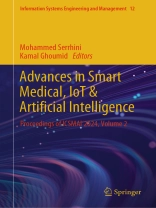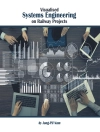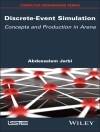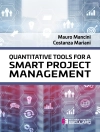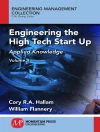This comprehensive book brings together the brightest minds in academic, featuring a curated selection of papers and presentations from the esteemed conference. With a focus on the intersection of the conference themes, this book provides a unique platform for researchers, practitioners, and innovators to share their cutting-edge research, innovations, and solutions.
Get ready to dive into the latest advancements in Artificial Intelligence and Internet of Things for Healthcare, Computer Vision, world of computer science, featuring advancements in machine learning, natural language processing, and more with the Proceedings of SMAI2024.
This book presents a comprehensive and interdisciplinary examination of the applications, challenges, and implications of AI-Io T convergence in different contexts such Smart Healthcare/Smart Technologies/Smart Industry, computer vision, and NLP. Through a series of erudite chapters, esteemed experts in computer sciences, healthcare, physics, technology, and research domains provide authoritative insights into the transformative potential of this synergy.
As editors, we are proud to present a curated collection of contributions that reflect the latest research findings, innovations, and best practices in IA technology.
The editors’ objective is to provide a nuanced and authoritative exploration of the AI-Io T nexus, with the aim of inspiring further research, collaboration, and innovation in the pursuit of excellence in Artificial Intelligence.
สารบัญ
Chapter 1.A desalination- refrigeration unit that uses photovoltaic/thermal (PVT) collectors to generate electricity and heat for desalination and refrigeration.-Chapter 2.From Data to Sleep Patterns: Leveraging Machine Learning for Sleep Efficiency and Prediction.-Chapter 3.Performance improvement of a SAC-OCDMA FSO system under climatic conditions for smart city applications.-Chapter 4.Smart strategies for heat transfer enhancement using nanofluids with complex geometries for optimal perfomance.- Chapter 5. Improving Natural Convection in a Nanofluid-Filled cavity through SMART Numerical Simulation.- Chapter 6. Utilizing SMART Approaches to Enhance Heat Transfer in a Rectangular Duct with a 7-Shaped Baffle Using the CFD Technique.- Chapter 7. Data Analysis for Quality Control of Solar Radiation Data in a Semi-Arid Climate: A Case Study of Ben-Guerir City, Morocco.- Chapter 8. Evaluation of the best cleaning strategy for a photovoltaic system installed in a harsh climate conditions: A case study in mid-south of Morocco.- Chapter 9. Analyzing Oxygen Production from Photovoltaic Electrolysis Using Machine Learning During the COVID-19 Period: A Case Study.- Chapter 10. Experimental study of the oscillatory motion of a heavy pendulum by an analog distance sensor with the Micro-Lab board.- Chapter 11. Numerical study of the compression of curved intersected honeycomb structures with double and single walls.- Chapter 12. Exploring the energy consumption of some typical applications: The case of sorting algorithms.- Chapter 13. Framework for Agent-Based Simulation of Energy and Water Usage in Smart Homes.- Chapter 14. Beyond the Lips: Exploring Factors Influencing Lipreading Accuracy in Real-World Conversations.- Chapter 15.Comparison of Effective Mass Approximation and Hyperbolic Band Model for Predicting Quantum Dot Emission Wavelengths.-…Etc.
เกี่ยวกับผู้แต่ง
Mohammed Serrhini is a professor with decades of academic and research experience in the Department of computer science at Faculty of Sciences, Mohamed First University Oujda, Morocco. Mohammed Serrhini finished his Engineering degree in computer science in 1996 from Polytechnic Institute of Applied Mathematics and Computer Science at Tula State University and Ph D in 2012, at the Faculty of Sciences of the University Mohamed Premier of Oujda. He leads innovative research in artificial intelligence (AI) and Cyber-security. His research interests are in the areas of computer vision, image processing, brain computer interface in education, IA security; His works has appeared in several prestigious journals. He has contributed in many collaboration Projects with European Union Universities. He has served as general Chair of more than 15 international conferences and has delivered a number of keynote talks on AI and cyber-security. Serrhini receives many awards such from UNESCO in 2022 among others.
Kamal Ghoumid received his Ph D degree from the Institut TELECOM, TELECOM Sud-Paris, Evry, France, and Institute FEMTO-ST of the Franche-Comté University (Besaçon, France), in 2008. He previously graduated as an engineer in Electronics and telecommunications at CNAM-Paris (France), received his Masters in Communication Systems from Paris-Est University (France) and specialized Masters in Technics of Radio communications. He has worked as a post-doctoral researcher at Jean Lamour Institute of Henri Poincaré University (Nancy, France) from 2008 to 2009, and the Institut FEMTO-ST of the Franche-Comté University, Besaçon as well. He is also an Assistant Professor in the National School of Applied Sciences (ENSAO), Mohammed Premier University of Oujda (Morocco), where he is the head of the research team on Signals, Systems and Information Processing. His research interests are mainly in signal processing and integrated optic components in the field of telecommunications, wireless and networks Communications, radio over fiber and communications systems.
